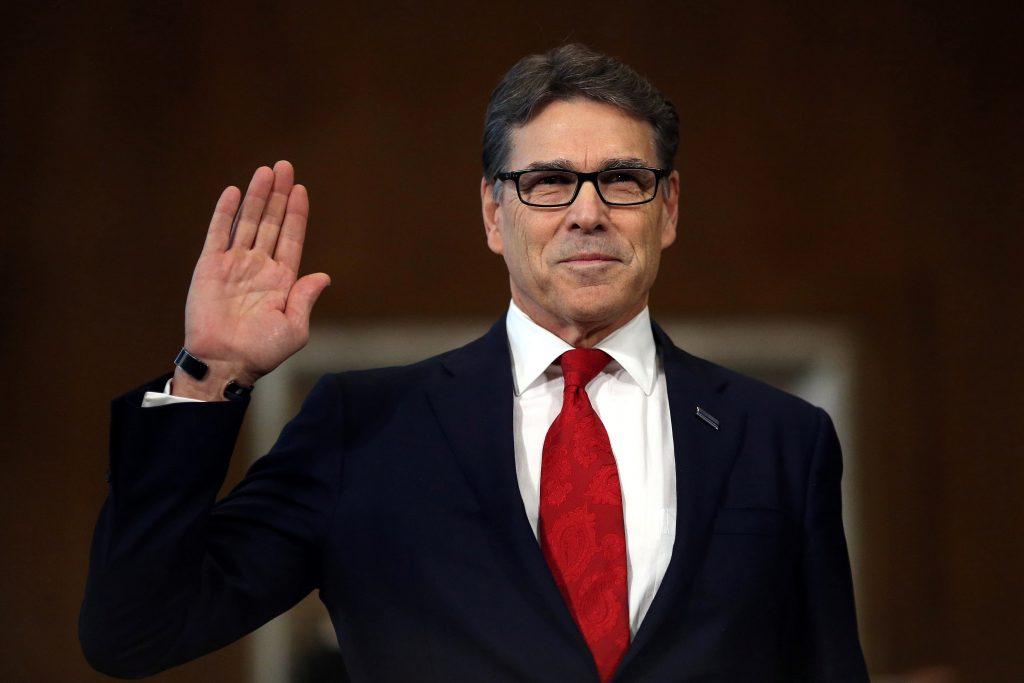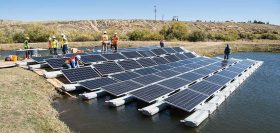Former Texas governor and two-time republican presidential candidate Rick Perry was sworn in as chief of the Department of Energy (DOE) last week, and many in the solar industry are wondering what to expect from the new Energy Secretary when it comes to renewable energy policy. Perry suggested eliminating the DOE during his 2011 campaign for the republican presidential nomination, and famously forgot the name of the agency during a debate, sparking headlines and briefly providing material for late-night TV comedians.
However, the former Texas governor more recently has stated that he regrets having taken that position, and now sees the value in the department’s work, including research and development. Despite his past statements, Perry proved to be one of President Trump’s less controversial cabinet picks, receiving bipartisan support, including the votes of 10 Democratic senators, including Debbie Stabenow of Michigan, Joe Manchin of West Virginia and Catherine Cortez Masto of Nevada, as well as Independent Angus King of Maine.
Environmental groups continue to hammer on Perry, however. Friends of the Earth senior strategic adviser Damon Moglen told the Washington Post: “Over the course of his career, Rick Perry has taken millions of dollars from the oil, gas and nuclear industries while pushing their dirty energy agenda.” He added, “Unlike the preeminent physicists who ran the department for the last eight years, Perry lacks the knowledge and experience to run the DOE.”
On the other hand, Perry’s track record as Texas governor includes considerable renewable energy development alongside promoting the state’s fossil fuel interests. “He’s shown that he was an ‘all-of-the-above’ governor. To the extent that energy is a key part of our Texas economy, Rick Perry was pushing economic growth through energy development. That included oil, gas, wind and solar,” said Jeff Clark, executive director of the Wind Coalition, the Texas affiliate of the American Wind Energy Association. “My great hope is that he will be a voice and will bring the success we’ve had to Washington, and help educate some of those folks who have never had an up-close look at how wind energy works,” Mr. Clark said.
Solar Energy Industry Association president and CEO Abigail Ross Hopper released the following statement:“As Governor of Texas, Incoming Secretary Perry clearly showed that he has an appreciation for renewable energy and infrastructure. We look forward to working with him and his staff to implement policies and programs that take advantage of the job-creating, economy-boosting opportunities that solar energy presents to all of America’s communities. Last year, solar was the largest new source of electricity capacity and now provides 260,000 Americans well-paying jobs.”
What is actually at stake for the solar industry under a Perry tenure at the DOE? Most importantly, he will oversee the renewable energy projects within the department. The DOE’s National Renewable Energy Labs (NREL) budget for solar currently stands at $55.5 million, second to $56 million for farm-based energy programs like ethanol. This money is for RC&D and technology transfer, in many cases through public/private partnerships. To date, Perry has not specifically voiced administration plans do this, but energy lobbyist Mike McKenna, who headed Trump’s Department of Energy transition team until late November, told the West Virginia Coal Association that current funding allocations favoring renewable energy would likely be changed under the Trump administration. Eliminating funding could seriously curtail research in fields like solar cell materials and efficiency.
Not all of NREL’s funding comes through the DOE, and not all renewable energy research in the U.S. is NREL funded, but NREL it is a vital part of the equation in the current push to bring new technologies to market. It would be hard for the Trump administration to make deep cuts in the NREL budget in light of solar and wind job growth numbers, but that certainly does not mean that they won’t do it. What the administration needs to understand, though, is that if our government does not fund the research, the Chinese government happily will, and the profits from those developments will not flow into the U.S. economy.
There is no question that Rick Perry will change the face of the DOE. His stance on climate change is lukewarm at best, but he most certainly understands the business benefits of renewable energy development, and what it has done for his home state.






